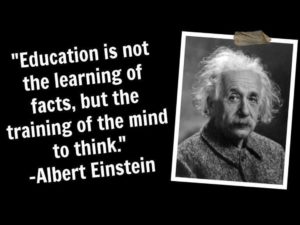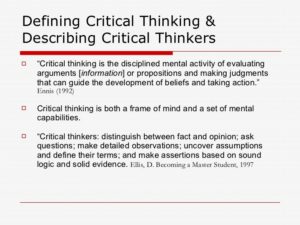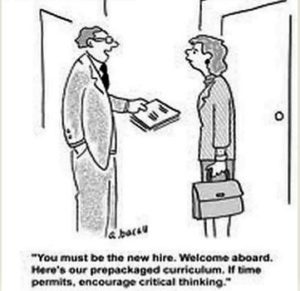Welcome!0
 Einstein has been credited to have said “You cannot solve a problem with the same thinking that created the problem.” The origin of this very interesting statement doesn’t matter. What matters is that too many students, through no fault of their own, are not learning how to think critically even in college.
Einstein has been credited to have said “You cannot solve a problem with the same thinking that created the problem.” The origin of this very interesting statement doesn’t matter. What matters is that too many students, through no fault of their own, are not learning how to think critically even in college.
If there is a consensus that there is a problem it may be that though high schools and colleges say they teach students critical thinking skills, they may not be. Admittedly, it is not easy. Teachers have definitive guidelines to follow and tasks that sometimes have nothing to do with teaching cognitive skills and students have deadlines and diversions that often do not allow time to spend on things they don’t immediately see as important. We have ALL been there, haven’t we?
 John Schlueter, a former journalist for Inside Higher Education, once pointed out that even though higher education has placed a great emphasis on critical thinking, no evidence suggests that such skills can even be taught. Critical thinking is a learned ability that MUST be taught. “If we realize that ‘critical thinking’ implies a set of general thinking skills that transfer from one subject or domain to another, then the task of identifying exactly what those skills are becomes extremely difficult, and perhaps impossible, to accomplish.”
John Schlueter, a former journalist for Inside Higher Education, once pointed out that even though higher education has placed a great emphasis on critical thinking, no evidence suggests that such skills can even be taught. Critical thinking is a learned ability that MUST be taught. “If we realize that ‘critical thinking’ implies a set of general thinking skills that transfer from one subject or domain to another, then the task of identifying exactly what those skills are becomes extremely difficult, and perhaps impossible, to accomplish.”
He points to research demonstrating that critical thinking only exists within the context that it is being taught, meaning that critical-thinking skills are rarely applicable across disciplines. Students must gain an exceptional amount of knowledge in a certain area before they can apply what they have learned to other fields of study.
I agree. I also believe that instructors must gain a deeper understanding of how they approach thinking within their own disciplines to help students develop better cognitive skills. However, many of them are entering the teaching profession without being taught the basics of how to think critically.
In every personal college and career planning binder, we prepare for our students,  we include a 13-page transcript of a college professor’s lecture he gave to over 350 other college professors, titled An Introduction to Critical Thinking. The reader can download it above to read and save for reference or in my essay Houston, we have a Problem The professor points out that while professors presumably have the ability to think critically because they had to learn such a skill to earn advanced degrees in their respective disciplines, many students never develop critical thinking skills. Why not?
we include a 13-page transcript of a college professor’s lecture he gave to over 350 other college professors, titled An Introduction to Critical Thinking. The reader can download it above to read and save for reference or in my essay Houston, we have a Problem The professor points out that while professors presumably have the ability to think critically because they had to learn such a skill to earn advanced degrees in their respective disciplines, many students never develop critical thinking skills. Why not?
 I believe the problem lies in that students are told “what to think,” not how to think. Many students find that learning the subject matter alone is so overwhelming that they have time for little else. Tests that are given do not measure a student’s critical thinking skills. Tests demonstrate the student’s ability to remember, dates, names, places, formulas, etc., etc., and have little to do with critical thinking.
I believe the problem lies in that students are told “what to think,” not how to think. Many students find that learning the subject matter alone is so overwhelming that they have time for little else. Tests that are given do not measure a student’s critical thinking skills. Tests demonstrate the student’s ability to remember, dates, names, places, formulas, etc., etc., and have little to do with critical thinking.
In 2009, I wrote about the Collegiate Learning Assessment. It was introduced in 2000. The purpose of the CLA was to measure and test college graduates’ critical thinking, analytic reasoning, problem-solving, and written communication skills. Since colleges’ participation was voluntary, and the results are not published it has served little purpose to the parents who are paying for most of the costs of college, now the student who wants to get the best return on investment. By the year 2011, the authors of the book Academically Adrift have determined that there is limited learning on college campuses.
This is why at Programs for Education, we encourage our students to understand what critical thinking REALLY means and understand what their natural and lifelong innate personalities and characteristics are to help them research and plan life beyond high school. Is college the next step or not? There are thousands of people who have accomplished success (what does success mean to you?) without a college degree. But if college is the next step, the buyer needs to know how to research the “product” beyond the rankings of colleges in US News & World Reports, et al.
REMINDER: If you are looking for something specific on our website, simply type in a KEYWORD into “Search”  e.g. Admissions, Scholarships, SAT, Advising, Drugs, JFK, Essays, Education, Major, Job, and so on. This will bring up all the articles related to that topic. Much of that information here will be helpful in your college planning depending upon your year of graduation.
e.g. Admissions, Scholarships, SAT, Advising, Drugs, JFK, Essays, Education, Major, Job, and so on. This will bring up all the articles related to that topic. Much of that information here will be helpful in your college planning depending upon your year of graduation.
Plus! Get your questions answered immediately on all college-related topics.  Some information, admissions, and financial aid tips we have for you here, you will not find anywhere else. Plus, if you are concerned about how to pay for college, we can show you how to pay for college from CASH FLOW ALONE. (See the last paragraph on that page.) Hundreds of parents have implemented this system and are not borrowing a nickel OR drawing down from savings. It is absolutely BRILLIANT!
Some information, admissions, and financial aid tips we have for you here, you will not find anywhere else. Plus, if you are concerned about how to pay for college, we can show you how to pay for college from CASH FLOW ALONE. (See the last paragraph on that page.) Hundreds of parents have implemented this system and are not borrowing a nickel OR drawing down from savings. It is absolutely BRILLIANT!
We offer to high school students and parents a FREE ‘get acquainted’ 75′ consultation online via ZOOM, phone, or in person, please call Eric Goodhart at 1 (978) 820-1295 or email using the ‘Contact Us’ link here.
“Exercising democracy between wars is like being a vegetarian between meals.”

